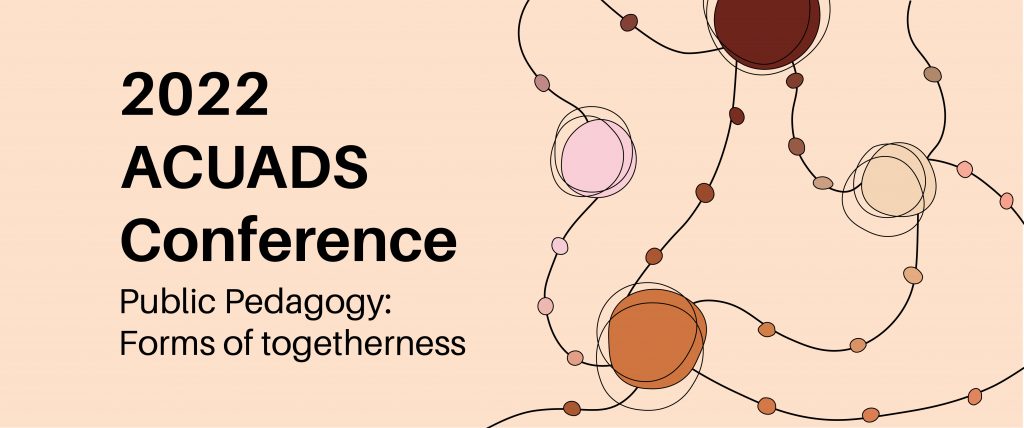ACUADS 2022 Conference
Public Pedagogy: forms of togetherness
Hybrid model: vertical/physical
For the full program, schedule, list of presenters and the recordings of the sessions, please visit the conference website here.

The pandemic has and continues to mark everything. How this time has played out, intervened, and transformed situated publics are starting points for collecting conversations across art and design contexts in Australia that reflect on public pedagogy. Projects undertaken through the pandemic are a way of speculating on what changes are inevitable in a COVID-19 context. Public is not one thing. Different publics exist in multiple and intersecting iterations, and each carry distinct pedagogical forms and potentials (Savage as cited in O’Malley et al., 2020).
This conference uses as its central provocation the “public quality of particular forms of togetherness and…the extent to which actual spaces and places make such forms of human togetherness possible” (Biesta as cited in O’Malley et al., 2020, p. 8). With the intention of exploring a range of perspectives within art and design, this conference elicits changing reference points to complicate and trouble ideas of public pedagogy asking, “that we accept that to thrive requires interaction and inter-relation;…to work towards reintegrating how we live after the dissociation imposed on us by the patriarchal and neoliberal ideologies that currently dominate our economics and politics [emphasis in the original]” (Millner & Moore, 2022, p. 208).
Current scholarship in the area has built on the construct of public pedagogy to “bring specificity to the nature of the public and of the public pedagogue and… involves a heightened turn to poststructural and postcolonial frameworks to further theorize processes of public pedagogy” (O’Malley et al., 2020, p. 7). While there is no consensus on how to define public pedagogy, engaging the term explicates its feminist, critical, cultural, performative, and/or activist dimensions.
Conceptualisations of public pedagogy currently focus on educative interruptions of public space, on popular yet disqualified knowledges, and on communal engagement that organises around shared dissent from marginalisation and alliances across difference. Two productive tensions that call for further exploration in public scholarship involve the need to problematise and exceed its colonialist and humanist origins, and amplify a relationship between scholarship and activism so that public pedagogies outside and inside institutional spaces foster an ethical vocation of the public sphere (O’Malley et al., 2020).
Presentations are invited that respond to the following prompts and related topics:
Human geography, wayfinding, mapping:
This theme expands on mode of human togetherness in which a range of human activity is preserved and actively pursued so that freedoms can appear. A common ground is not the goal but rather articulates an interest in a common world that promotes democratic forms of collective action, and how such forms might be advocated for and sustained. These forms of human action through which freedom can appear; educational actions and interventions (beyond schools) that have political a/effect and impact have been widely acknowledged through the pandemic. While traditionally formulated in terms of transformation, liberation, emancipation, social capital, community cohesion or good citizenship, contemporaneously a more, pluralistic approach inclusive of more than human and posthuman intervention in the urban public space/domain/sphere is required.
Public art, public space, domestic/public space:
Projects enacted through the pandemic have shifted the focus on how meanings are created through the interactions between the artworks and their participants and how public arts projects work pedagogically to disrupt dominant discourses in/with public space. Private spaces have also increasingly become public changing the way the domestic space is configured, scrutinised, used and shared.
Feminist activism, resistance, social activism, policing and politics of space, environmental activism, public activism:
The pandemic has seen artist and designers engaged in activism, as we saw the pandemic aggravate existing social inequalities—from the identification of essential workers through access to healthcare and childcare during lockdowns to domestic violence, and racism. Responses called for a political reconstitution of public art spaces to highlight the activist possibilities of artistic/design engagement. Feminist communitarian public pedagogy as a robust conceptual framework recognises that thriving requires interaction, iteration and integration.
Physical versus temporal space, digital publics galleries/museums:
Public venues have increasingly used digital technologies to engage a locked down or hesitant public, which has opened up a space to evaluate, review and create or design both outside and inside existing public institutions such as galleries and museums. This theme “draw[s] attention to public memory, the ideological nature of display, the epistemological influence of historical forces, embodied and affective forms of learning beyond language, and historical sites of public discourse” (O’Malley et al., 2020, p. 5).
Contact for submission: ACUADSconference2022@ecu.edu.au
